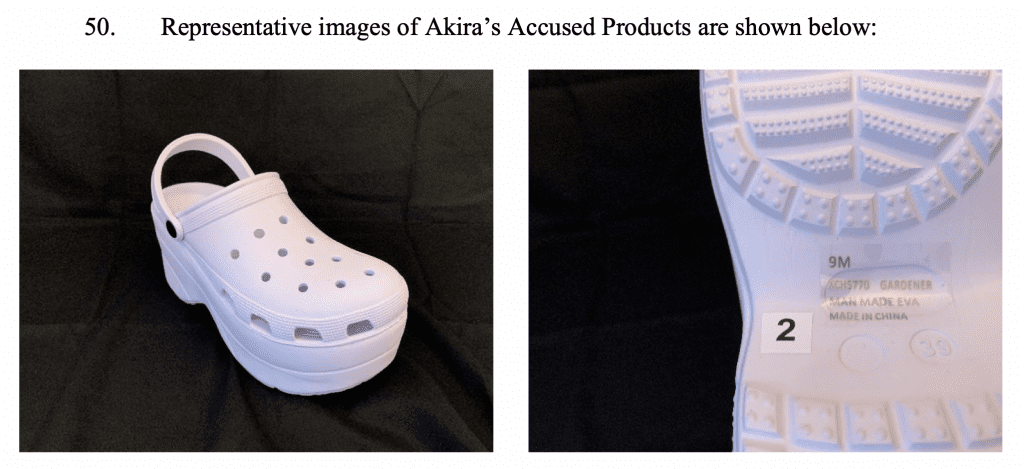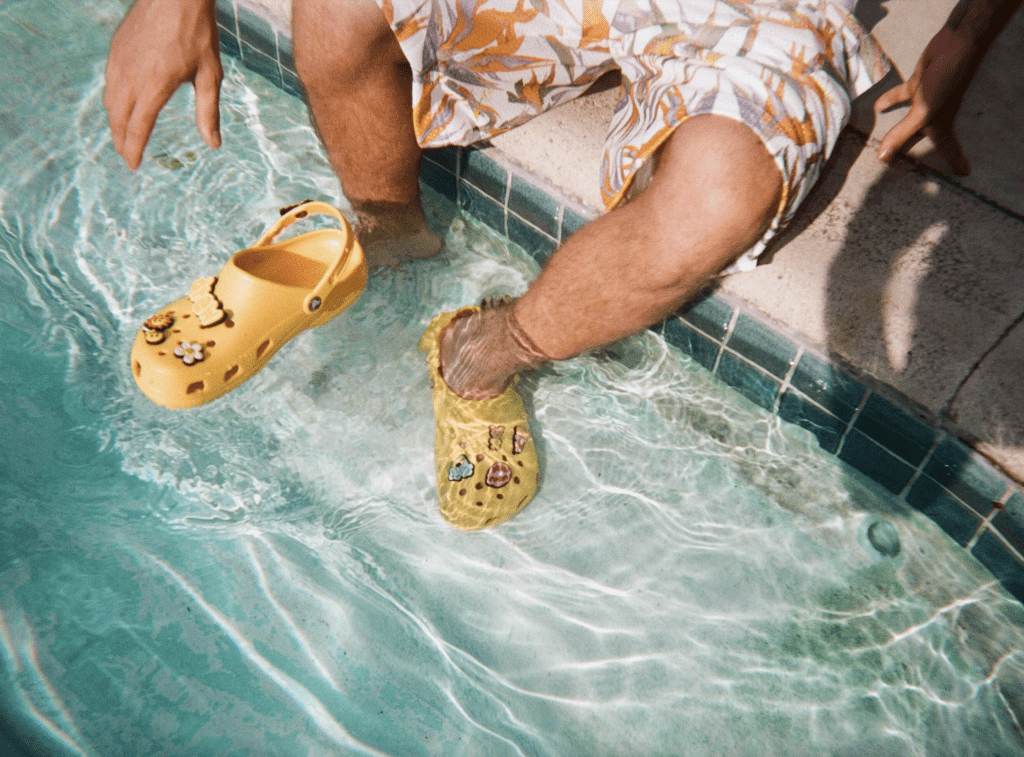Crocs is doubling-down on an existing effort to rid the market of a striking influx of fakes by way of a handful of newly-filed trademark lawsuits. On the heels of lodging a complaint with the International Trade Commission in June claiming that two dozen companies – from Skechers to Loeffler Randall – are engaging in the unlawful importation and sale of “certain footwear products and packaging that violate [its] registered trademarks,” including its “CROCS” word mark, as well as the 3-D design of its famous footwear, the Broomfield, Colorado-based footwear brand has filed four new trademark infringement and dilution suits against many of those same parties.
According to the complaints that it filed on Tuesday, including one in federal court in Illinois, which names Bijora, Inc. d/b/a Akira as a defendant, Crocs asserts that it maintains an array of “valuable trademarks” for its Classic Clog shoe, which it first began selling in 2003. “These trademarks include Crocs’ iconic design mark,” including the “three-dimensional configuration of the outside of an upper for a shoe, featuring holes placed across the horizontal portion of the upper [and] a textured strip along the vertical portion of the upper having openings,” which Crocs refers to as its “3D Marks.”
“Widely recognized by the general consuming public of the United States as a designation of origin of the footwear products that are manufactured, sold, distributed, and promoted by Crocs,” the footwear brand claims that its 3D Marks have become “well-recognized and famous” over the past two decades, thanks, in part to the “vast network of domestic distribution channels, including major retailers and department stores,” through which its footwear is offered, as well as the widespread marketing efforts that the company engages in the promote its offerings.

Beyond that, Crocs points to “unconventional collaborations with different brands, celebrities, and artists,” which have enabled its Classic Clog to “reach diverse and specific psychographic market segments as the shoe is regularly repackaged into new footwear models bearing the Crocs 3D Marks.” In the process, the company claims that “over the past three calendar years,” it has sold “millions of pairs of shoes bearing the 3D Marks in the United States alone, corresponding to hundreds of millions of dollars in revenue.”
Against that background, Crocs asserts that it falls victim to a significant “scale of this infringement,” including as a result of products sold by Chicago-based Akira, which Crocs alleges is offering up infringing footwear by way of a number of lookalike foam clogs, including a platform pair, almost certainly a nod to the platform pair of Classic Clogs that Crocs made in collaboration with Balenciaga in 2018. According to Crocs, the footwear being offered up by Akira bears designs that “are likely to cause confusion with the Crocs 3D Marks,” and that “are likely to dilute Crocs 3D Marks.” In fact, Crocs claims that “Akira’s intent to create associations with Crocs and to free ride on Crocs’ goodwill is evident from at least the close similarities between Akira’s products on the one hand, and the famous Crocs 3D Marks on the other hand.”
In addition to the “overwhelming similarities between Akira’s products and the Crocs 3D Marks,” Crocs claims that consumers are likely to confuse the two companies’ offerings, as “consumers of shoes like those at issue here are not likely to exercise great care in resolving likely confusion in their initial product interest, at the point of purchase, or in post-sale exposure.” More than that, Crocs argues that “more sophisticated consumers are likely to experience cognitive dissonance regarding the source, affiliation, sponsorship, or association of Akira’s products when confronted with promotions and sales of Akira’s [shoes].”
Indeed, Crocs – which saw a boom in sales during the pandemic, as consumers sought out comfortable wares, including footwear – claims that as indicated by customer reviews left on Akira’s e-commerce site, “Several ‘verified buyers’ of Akira’s [shoes] have actually been confused at the point-of-sale as to the source of the shoes, and have referred to the accused products as ‘CROCS’ despite no affiliation between Akira and [Crocs].”

With the foregoing in mind, Crocs accuses Akira of engaging in trademark infringement and dilution, and false designation of origin, and of violating the Uniform Deceptive Trade Practices Act, and is seeking monetary damages and injunctive relief barring the company from advertising and selling infringing footwear. In addition to Akira, Crocs has named Walmart, Hobby Lobby Stores, Loeffler Randall, Fujian Huayuan Well Import and Export Trade Co., Ltd., and Legend Footwear, Inc. d/b/a Wild Diva, as well as about a dozen other companies, as defendants in three separate but similar lawsuits.
On Tuesday, Daniel Hart, Crocs’ chief legal officer, said in a statement to Law360 that the cases “underscore our determination to take forceful steps to protect our trademarks and other intellectual property.” He further asserted, “We will not tolerate the infringement of our rights or those who try to freeride on the investments we have made in our brand.”
The cases come days after the U.S. International Trade Commission voted to initiate a probe into the import and subsequent sale in the U.S. of footwear and packaging that allegedly infringes the trademark-protected offerings of Crocs. In a July 6 Notice of Institution of Investigation, the ITC revealed that it has voted in favor of launching an investigation in order to determine whether the companies cited by Crocs, including Skechers, Hobby Lobby, Loeffler Randall, and 20 others, are, in fact, importing into the U.S. and selling trademark infringing goods in violation of section 337 of the Tariff Act of 1930, and whether they are violating the Tariff Act “by reason of false designation of source or trademark dilution” in connection with the lookalike products, and thereby, creating “a threat or effect … [of] destroy[ing] or substantially injuring an industry in the United States.”
The case is Crocs, Inc. v. Bijora, Inc. d/b/a Akira, 1:21-cv-03698. (N.D.Ill.)














